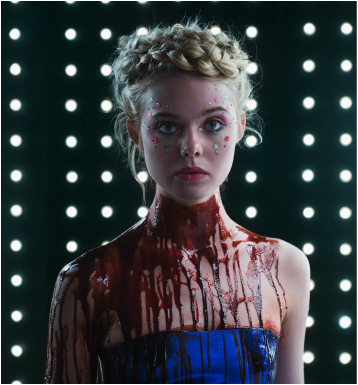Review:
"The Neon Demon"

Release Date: June 24, 2016
Rating: R Running Time: 117 minutes The Neon Demon is the metaphorical horror story about Los Angeles that Dario Argento never directed. Nicolas Winding Refn’s savage takedown of the City of Angels, and the entertainment industry that feeds upon so many pretty young things, also reveals itself at the last minute to be his Psycho, aka a black comedy that only its director knows is supposed to be funny. Beyond its mildly amusing payoff, though, there’s not much humor to be found in The Neon Demon aside from the few sardonic moments that reinforce the commonly held belief that the fashion industry heavily contributes to the distortion of body image. Elle Fanning stars as Jesse, an aspiring model from small-town U.S.A who happily concedes she has no discernible talent but believes she has the face and the look to make it big in L.A. All it takes is one photo shoot—and a bizarre, messy one at that—for Jesse to get her foot in the door. From there, Refn follows Jesse as she encounters the loathsome movers and shakers who can help or hurt her before she even has a chance to strut down a catwalk. Refn can barely hide his contempt for the designers who seek to exploit the weak and the naïve or for the models who willingly go under the knife in order to gain a slight edge over the competition. “Are you food or are you sex?” Jena Malone’s makeup artist Ruby asks Jesse following a photo shoot. It’s a question that Refn doesn’t answer until the end of The Neon Demon, but it is clear from the beginning that Jesse enjoys the attention lavished upon her by those who are both enamored with and jealous of her natural beauty. If Jesse arrives in L.A. an innocent, and it’s a matter of perspective as to whether she does, she certainly gets caught up in the hysteria that surrounds her debut as a catwalk model. One of the problems with The Neon Demon is that everyone sees in Jesse a transformative quality that could make her a supermodel for the problems—but Fanning never exudes that undefinable “it” to make us believe the hype or to accept Jesse as the potential new face of fashion. Granted, Fanning is required to spend much of The Neon Demon looking like a deer caught in the headlights, but when she’s dressed up and made up, the camera loves her no more than it loves the models who stand or walk beside Fanning. It also doesn’t help that Jesse is the least interesting character in a cautionary tale that is filled with colorful cyphers, including Abby Lee Kershaw and Bella Heathcote’s hostile models, Alessandro Nivola’s arrogant designer, and Keanu Reeves’ creepy motel manager. Jesse is supposed to be something of a blank slate, but Fanning and Refn never manage to make her more than she begins as even after she gets a taste of the limelight. Given The Neon Demon is about misogyny in fashion, Refn steers clear of exploiting his beautiful cast—until the end of the film when things get bloody and he allows his camera to linger longingly on the bodies of two women in a shower. It’s an unexpected moment that’s straight out of a Zalman King softcore porn romp, one that certainly hints at the film’s climatic reveal, but also one that could have been shot in a way that didn’t seem so voyeuristic. It is also a scene that is representative of Natasha Braier’s exquisite cinematography, which gives The Neon Demon a glossy veneer that plays up the superficial nature of both L.A. and the fashion industry. Cliff Martinez’s unnerving electronic score—which is deserving of an Oscar nomination—perfectly matches The Neon Demon’s meticulous pace and haunting atmosphere. The Neon Demon doesn’t much to say about the corrupting influence of L.A. and the fashion industry that doesn’t been said before, and at times surrenders to music video clichés, but at least Refn’s makes his occasionally contradictory statements about the exploitation of women with style and panache. Robert Sims Aired: June 23, 2016 Web site: http://theneondemon.com |
|
